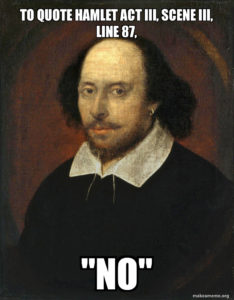I think it’s a little odd that script-writing doesn’t come up much in the curriculum. I suppose technically Shakespeare plays are scripts but it never felt like they were being studied as scripts, and they certainly weren’t related to creative writing in my experience.

But when you think about it, scripts are maybe the form of writing most familiar to kids. They probably have a lot more exposure to TV and Movies than novels or poetry.
Anyway, if you’d like to introduce script writing to your group, or you have a writer who’s interested in scripts, may I direct you (and them) to the BBC Writers Room site. It’s a huge site full of resources for script writers. They actually run this site to attract the scriptwriters of tomorrow and they regularly run courses and competitions and submissions slots for scriptwriters.
But you don’t have to be a professional to get a lot out of the site. There is a fantastic script library, that has the full scripts of various TV shows and films for you to read. This is quite helpful for learning how to lay out a script as well as write one, but they also have separate articles on how to format the different kinds of scripts. There are interviews with directors and writers, videos with exercises for script writing, and genre toolkits so you can learn about the different kinds of scripts. It’s just somewhere you can point your writers to if they’re interested.
If you’d like to talk to them about scripts that they might not have considered before, you could suggest they try a radio script.
As a prose writer myself, I sometimes forget that poetry exists, never mind scripts. And Radio isn’t usually the first thing we think of, even when we do remember that scripts are also writing. And we usually associate radio plays with middle aged, middle class Radio 4 listeners, not teenagers, but they can actually be a lot more fun to write than stage/TV/film scripts.

We tend to think of Radio as being limited because of its lack of visuals, but in fact, when you’re writing a script, this is its strength. It’s completely unlimited. You can create anything on radio, just with sound effects. Which means that you, unlike George Lucas, can do a 3-generation, 9-episode space epic with zero budget. No CGI, no costumes, no massive crew, no lighting, no cameras, no sets, no stage makeup, you can even have the actors play multiple roles.

Radio is a completely limitless medium. If you can imagine it, you can write it. And if you have an aspiring scriptwriter who wants to go as far as actually making the end product, many of the sound effects have already been created and are available to download online and the rest you can create yourself.
But if your writers just want to write a script and aren’t bothered about it being made, then of course they can do TV space battles to their heart’s content.
I also found this on the Writers Room site and thought it was useful for any kind of writing, script or otherwise, so you could print it out and give it to your writers as a little checklist for when they’re brainstorming or stuck –
John Yorke’s 10 Questions are used by top TV writers all over the UK to unlock and refine their stories:
- Whose story is it?
- What does the character need?
- What is the inciting incident?
- What does the character want?
- What obstacles are in the character’s way?
- What’s at stake?
- Why should we care?
- What do they learn?
- How and why?
- How does it end?
(NB: the inciting incident is just the thing that draws the character into the story. Eg Her name is drawn at the Reaping, He gets a letter from Hogwarts, She is orphaned, A stranger arrives in town etc)

In other news, I’m planning some exciting guest posts from some real live published authors (!) to talk about their writing journey, share their top tips for great writing, and inspire your young writers! Watch this space…
Leave a Reply